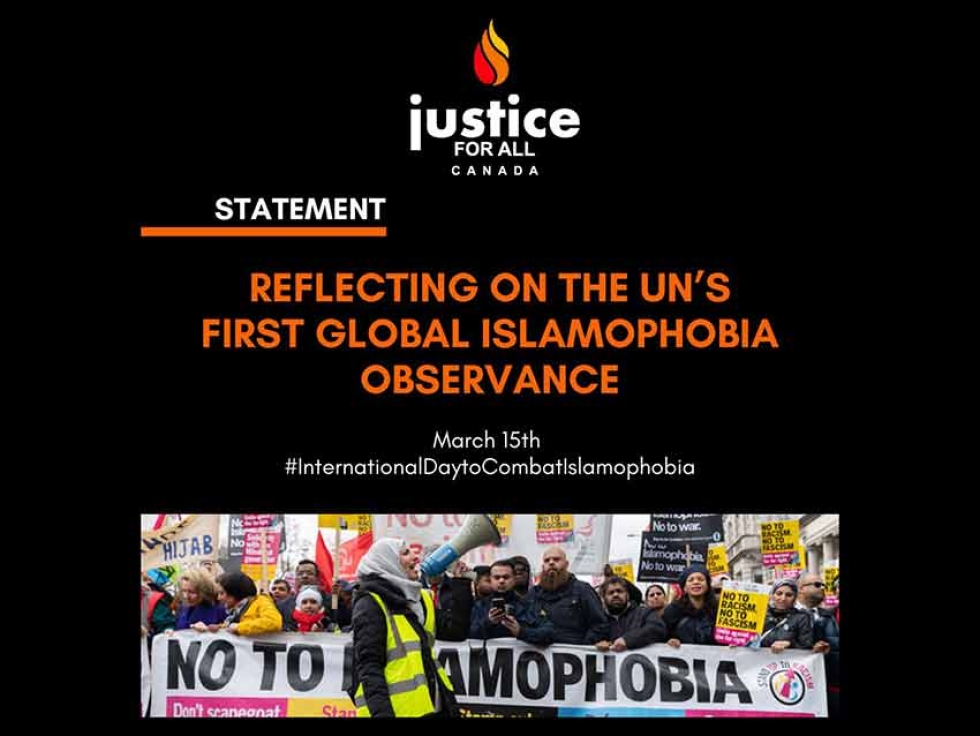
Mar
Justice for All Canada: Reflecting on the UN’s First Global Islamophobia Observance
Written by Justice for All CanadaJustice For All Canada welcomes March 15th, 2023, as the UN's first International Day to Combat Islamophobia. Dedicating an annual global observance to anti-Muslim racism and discrimination is critical to addressing alarming levels of bigotry levelled at Muslims, with devastating impacts on their communities worldwide.
“On this International Day to Combat Islamophobia, we stand in solidarity with Muslims worldwide impacted by hate-motivated incidents and attacks. We recommit ourselves to challenging the violent racism that’s inspired some of the most harrowing transgressions against Muslims in Canada and globally. Islamophobia is not just a Muslim issue, but a threat to Canadian values of tolerance, pluralism, and human rights, which we hold dear,” expressed Taha Ghayyur, Executive Director.
As a human rights and genocide prevention organization, Justice For All Canada condemns all forms of racism and discrimination against all religious groups. During the Canadian government’s National Summit on Islamophobia, we submitted two reports with policy recommendations to address the growing intolerance of Muslims in Canada and worldwide.
Our 28 Recommendations for Intervention Against Domestic Islamophobia
Our 15 Recommendations for Intervention Against Global Islamophobia
Global Islamophobia impacts Canadians across the country. Many Canadians also have personal roots and family members in countries with policies inciting harm to Muslim minorities. We urge all levels of the Canadian government, civil society organizations and individuals, to support action-oriented change. This starts with Canada condemning the following significant instances of religious discrimination and ensuring the rights and dignities of Muslims are protected under international law.
India: The rise of Islamophobia in India is well documented under the current Modi-led Hindu nationalist government (Bharatiya Janata Party). Muslims in India endure discriminatory policies that have left many stateless because of their religion. Mob violence against Muslims and Dalits is a daily occurrence with near impunity for perpetrators. Anti-Muslim atrocities in India receive tacit support from elected officials, who frequently use their public platforms to promote hatred and incite genocidal violence against Muslims, Dalit, Christian, Adivasi and Sikh minorities.
Indian-occupied Kashmir: Kashmiri Muslims have faced decades of Indian state-sponsored violence and repression. Since India revoked Kashmir's autonomy in 2019, the situation has worsened, with the Indian state using internet shutdowns and mass arrests to suppress dissent. According to the Jammu Kashmir Coalition of Civil Society, at least 229 people, including 32 children, were killed in 2020 alone.
East Turkestan: The situation against Uyghurs constitutes a mass genocide with little to no global intervention. China’s communist government has detained over one million
Uyghur Muslims in internment camps. They are subjected to forced labour, indoctrination, and abuse. Chinese authorities have also implemented shocking policies that suppress Uyghur Muslim identity, forced labour, and recent zero-COVID policies, legislating further brutalities against them.
Rohingya: Muslims have faced persecution and violence for decades, culminating in a brutal genocide in 2017. Even after the displacement of 700,000 Rohingya, mass rapes, torture, and forced labour, Rohingya in Myanmar and refugees in neighbouring states have severe restrictions on their movement, healthcare, and education.
Palestine: Muslims and Christians in Palestine have long faced discrimination and violence under Israeli occupation. According to Human Rights Watch, Israel's policies in the occupied territories amount to apartheid, with Palestinians subjected to systematic discrimination and repression. Muslims in Gaza have faced severe restrictions on their movement, access to healthcare and clean water. The Israeli state also holds the largest concentration of child and youth detainees.
Sri Lanka: Muslims face discrimination, violence, and hate speech. Since 2019, a surge of anti-Muslim sentiment and violence has gone unacknowledged by authorities, who have failed to reprimand abusers or facilitate UN-requested reconciliation for religious groups. State-imposed forced cremations of COVID-19 victims, arbitrary arrests, and attacks on businesses and mosques continue inspiring further anti-Muslim hate crimes in Sri Lanka.
Global Islamophobia Transported to Canada
The above phenomenon of global Islamophobia has indeed found its way into Canada.
The rise of populist movements and the normalization of anti-immigrant, anti-Muslim rhetoric by political leaders contributes to a climate of fear and division, fuelling hatred and discrimination against Muslims.
Recent increasing Islamophobia in Canada is due to far-right extremist groups emboldened by fascist movements in countries like India and Myanmar. Such governments allow anti-Muslim sentiment and hatred to flourish. This often occurs on social media platforms like Meta (the parent company of Facebook).
However, the implications of global Islamophobia on Canadians are significant;
Muslims in Canada face discrimination and hate crimes, including verbal and physical attacks, vandalism of mosques, and employment discrimination.
Islamophobic incidents harm Muslims and erode the social fabric of Canadian society by promoting division and eroding trust and harmony among diverse communities.
Islamophobia contributes to broader exclusion and marginalization by limiting the opportunities and social mobility of Canadian Muslims. This will have long-term implications for the economic and social well-being of Canada.
Justice For All Canada calls on the Canadian government to encourage more opportunities for education and awareness of the harms of Islamophobia.
We call on Prime Minister Justin Trudeau and Foreign Affairs Minister Melanie Joly to hold elected perpetrators of anti-Muslim hate speech and discrimination accountable using strong policy measures.
Canadians continue waiting for a comprehensive approach to ending Islamophobia, which must include individual-level actions and broader policy changes that penalize Islamophobic hate speech and crimes against humanity.















